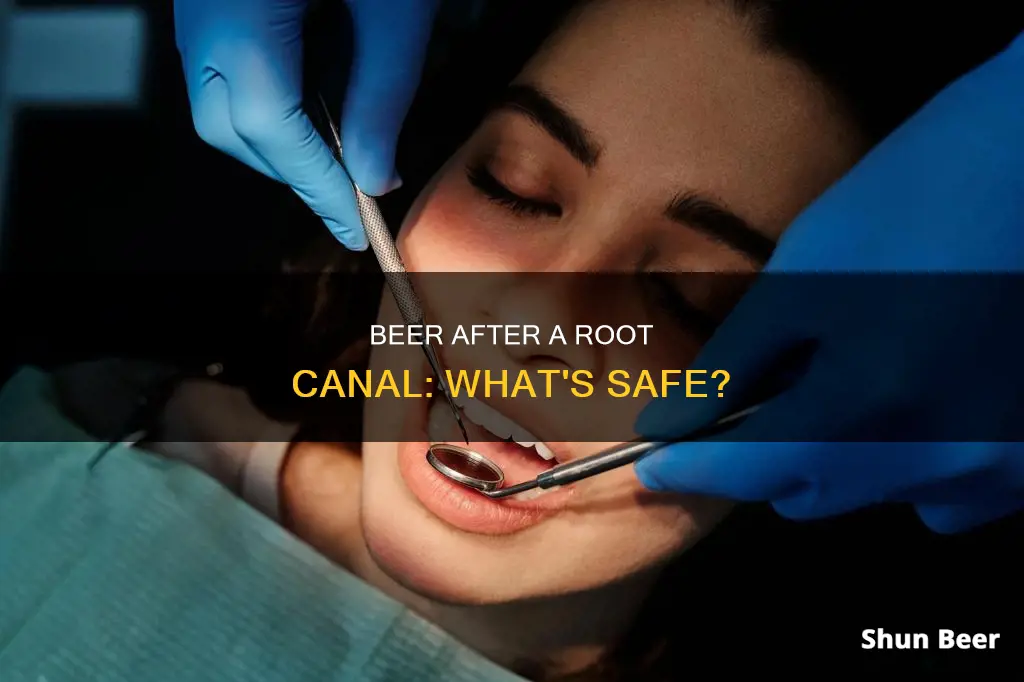
Drinking alcohol after a root canal is generally discouraged, as it can hinder the healing process and cause excessive bleeding. Alcohol thins the blood, delaying the formation of blood clots at the surgery site, which is crucial for recovery. Additionally, alcohol may increase post-procedure bleeding, especially when combined with strong pain medication, which can lead to severe and even life-threatening side effects. Dentists typically recommend abstaining from alcohol for at least 48 hours after the procedure to ensure a smooth recovery and optimal oral health.
| Characteristics | Values |
|---|---|
| Drinking alcohol after a root canal | Not recommended due to potential interference with the healing process |
| Alcohol's impact on blood | Alcohol thins the blood, hindering the formation of blood clots at the surgery site and potentially causing excessive bleeding |
| Mixing alcohol with pain medication | Can overwhelm the liver and kidneys, causing severe and potentially life-threatening side effects |
| Drinking alcohol before a root canal | May be acceptable in moderation, but the smell may distract the dentist |
| Recommended abstinence period | At least 48 hours to ensure smooth recovery and optimal oral health |
What You'll Learn
- Drinking alcohol after a root canal can slow down the healing process
- Alcohol can cause excessive bleeding, bruising, and swelling
- Alcohol mixed with pain medication can overwhelm your liver and kidneys
- Alcohol can mask side effects from your root canal
- Dentists recommend not drinking for at least 48 hours after a root canal

Drinking alcohol after a root canal can slow down the healing process
Consuming alcohol after a root canal can also increase the risk of infection. Alcohol weakens the immune system, making it more challenging for your body to fight off any potential bacteria or viruses that could enter through the dental work site. It is crucial to prioritize proper healing and reducing the chances of complications by abstaining from alcoholic beverages during the recovery period.
If you have been prescribed strong pain medication following your dental treatment, adding alcohol into the mix heightens the risks considerably. The combination of liquor and potent pharmaceuticals can cause severe side effects, some of which may even be life-threatening. It is never wise to combine these two substances, whether or not you've had a root canal.
Dentists generally recommend maintaining distance from alcoholic drinks for at least 48 hours post-root canal therapy. Patience during this period will ensure a smooth recovery and optimal oral health. After the numbness wears off following the procedure, you can resume drinking alcohol if desired, but excessive consumption can lead to complications such as excessive bleeding or delayed healing.
Drinking Beer on Texas Streets: What's Legal?
You may want to see also

Alcohol can cause excessive bleeding, bruising, and swelling
It is not advisable to consume alcohol after a root canal. Drinking alcohol can hinder the healing process by thinning your blood, which can cause excessive bleeding, bruising, and swelling. Alcohol impairs your liver's ability to function properly, and when combined with pain medication, it can cause significant damage to your liver and kidneys.
Alcohol acts as a vasodilator, relaxing and expanding your blood vessels, which increases blood flow throughout your body. This means that even minor bumps can cause blood vessels to burst, leading to bruising. Additionally, alcohol affects your brain, impacting your judgment, decision-making, and motor skills, making you more prone to accidents and injuries.
Chronic alcohol misuse can lead to liver damage, which is a serious health concern. Liver disease due to alcohol abuse can cause scarring and cirrhosis, with symptoms such as easy bruising and abnormal bleeding. It is important to note that liver damage caused by cirrhosis is not reversible and is associated with high mortality rates.
To ensure a smooth recovery after a root canal, it is recommended to avoid alcohol consumption, especially if you are taking antibiotics or pain medication. Consult with your dentist or healthcare provider for specific guidelines regarding alcohol consumption after your dental procedure.
Ear Piercing and Beer: What's Safe?
You may want to see also

Alcohol mixed with pain medication can overwhelm your liver and kidneys
It is not advisable to consume alcohol after a root canal. Drinking alcohol can hinder the healing process, causing excessive bleeding, bruising, and swelling, and prolonging recovery. Alcohol consumption can also mask any side effects from your root canal, making it difficult to communicate your symptoms accurately to your dentist.
Furthermore, if you are taking any pain medication, mixing it with alcohol can overwhelm your liver and kidneys and cause significant damage to your system. Alcohol and painkillers can lead to a dangerous drug interaction, with severe health consequences. This combination can cause drowsiness, memory problems, and breathing difficulties, increasing the risk of an accidental overdose.
The combination of alcohol and over-the-counter pain medications, such as Tylenol, ibuprofen, or aspirin, can also have serious adverse effects. For example, mixing Tylenol with alcohol can lead to irreversible liver damage, while combining alcohol with ibuprofen or aspirin can increase the risk of stomach problems and gastrointestinal bleeding.
Prescription opioid painkillers, when mixed with alcohol, can have deadly consequences. Alcohol enhances the effects of opioids, leading to a more intense high but also causing extreme drowsiness. This combination slows down breathing and heart rate, decreases oxygen levels, and increases the risk of slipping into a coma. In some cases, this can lead to serious brain damage, organ failure, or even death.
Therefore, it is crucial to abstain from alcohol consumption while taking any pain medication, regardless of the dosage. Always consult with your healthcare provider or pharmacist for specific instructions and to discuss your medical history.
Beer Sleeves: Do They Keep Drinks Cool?
You may want to see also

Alcohol can mask side effects from your root canal
Drinking alcohol after a root canal can have several side effects and health complications. Firstly, alcohol is a blood thinner, which can cause excessive bleeding, bruising, and swelling at the surgery site. This can hinder the healing process and make it take longer.
Secondly, alcohol may increase the risk of infection. It weakens the immune system, making it more challenging for your body to fight off bacteria or viruses that could enter through the dental work site. This can cause severe side effects, and in some cases, even lead to life-threatening situations.
Additionally, if you are taking any antibiotics or pain medication, you should not consume alcohol as this can cause a synergistic effect and overwhelm your liver and kidneys, causing significant damage to your system.
Furthermore, alcohol can make you dizzy and sleepy, which may mask any side effects from your root canal. Recognizing and communicating these side effects to your dentist is crucial for your recovery.
Therefore, it is generally recommended to abstain from alcoholic beverages for at least 48 hours after a root canal to ensure a smooth recovery and maintain optimal oral health.
Ibuprofen and Beer: Is It Safe to Mix?
You may want to see also

Dentists recommend not drinking for at least 48 hours after a root canal
It is recommended that you wait at least 48 hours after a root canal before drinking beer or any other alcoholic beverage. This is because alcohol can thin your blood, making it harder for your body to form a clot at the surgery site and increasing the risk of excessive bleeding. If you've been prescribed strong pain medication, mixing alcohol with your medication can cause severe and potentially life-threatening side effects.
Drinking alcohol after a root canal can also increase the risk of infection, as alcohol weakens the immune system, making it harder for your body to fight off bacteria or viruses that could enter through the dental work site. Additionally, alcohol consumption can hinder the healing process, leading to slower healing and potential complications.
It is crucial to prioritize proper healing and reducing the chances of complications by abstaining from alcoholic beverages during the recovery period. Dentists recommend following these guidelines when it comes to alcohol consumption after a root canal: avoid alcohol for at least 48 hours following the procedure. If you weren't prescribed strong pain medication, drinking in moderation may be okay, but it's still advisable to check with your dentist first.
Excessive alcohol consumption can lead to complications such as excessive bleeding or delayed healing, so it's important to be mindful of your intake. While it may be tempting to enjoy a drink once the numbness wears off, remember that abstaining will promote a healthier and faster recovery.
Antidepressants and Alcohol: Is It Safe to Mix?
You may want to see also
Frequently asked questions
It is not recommended to drink beer or any other alcoholic beverage after a root canal as it may hinder the healing process. Alcohol can cause excessive bleeding, bruising, and swelling, and may also mask side effects from your root canal, making it difficult to communicate your symptoms to your dentist.
Dentists recommend waiting at least 48 hours after the procedure before consuming alcohol. It's important to prioritize proper healing and give your body enough time to recover.
Alcohol consumption can interfere with the recovery process and lead to slower healing. It can also increase the risk of infection as it weakens the immune system. Additionally, if you're taking strong pain medication, combining alcohol with these drugs can cause severe and potentially life-threatening side effects.
It's best to stick to cool liquids and soft foods after a root canal. You can also eat on the side of your mouth that has not been treated.







